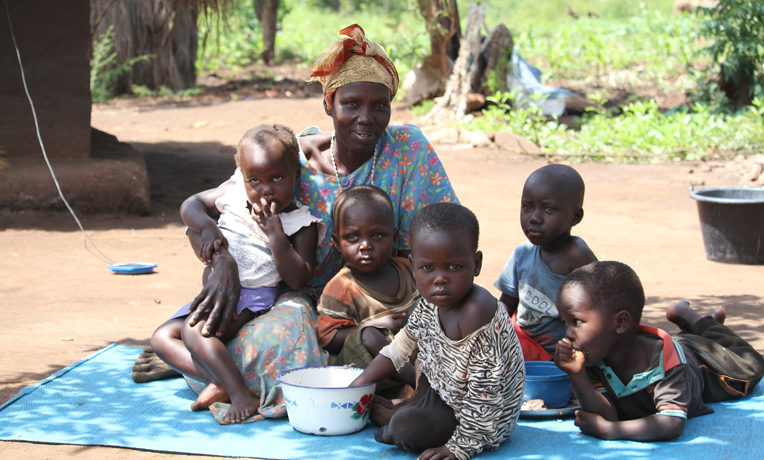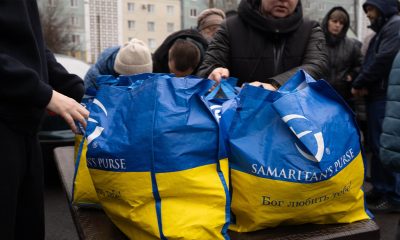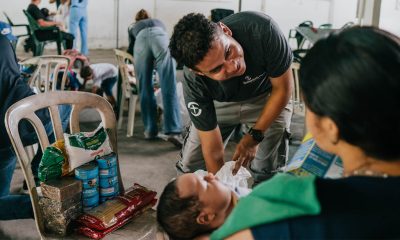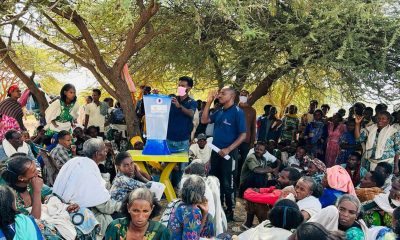A widowed mother flees the civil war in South Sudan to keep her family alive.
Rosemary’s calm words startled me. We sat outside her dwelling in the northwest Uganda Bidibidi refugee settlement—a peaceful area with thatched roof huts and emergency tarps dotting the bushy green landscape in every direction. As she softly recounted her story of fleeing her home in South Sudan, I knew that hidden behind her careful words were experiences of unimaginable pain.
Rosemary is a widowed mother of six children and has lived with her family in Bidibidi since August 2016. She fled the violence of South Sudan’s civil war to keep her family alive.
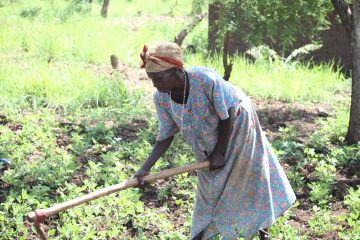
Rosemary tends her garden grown from seeds provided by Samaritan’s Purse.
When they arrived in Bidibidi—now home to more than 270,000 refugees—life was incredibly hard. Her large family crowded under a single tent to sleep each night.
“The place was congested—everything was bushy. You have to begin from nowhere,” she said.
Life is now radically different for her and millions of South Sudanese. South Sudan’s brutal civil war has displaced 4 million people. There are reports of widespread rape and other unspeakable violence. Famine has gripped the land.
“Sometimes I ask, ‘Why?’” Rosemary said. With a war of such cruelty, she finds no good answer.
During the past several months, Rosemary’s family has cleared and groomed their settlement plot and built thatched-roof huts where they cook and sleep. Through seeds, plants, and tools provided for her in the Samaritan’s Purse livelihoods program, Rosemary is beginning to plant a garden. She has started to grow cassava, groundnuts, and orange sweet potatoes behind her home.
She is hopeful that her produce over the next few months will help her family battle hunger. “I’m a bit happier,” she said. “At least from nothing, we have something.”

Rosemary and her grandson.
Rosemary’s eyes light up as she talks about her job in South Sudan teaching upper elementary and middle school students English, math, science, and social studies. It’s a job she very much misses.
Though she is hopeful that she might one day teach again, right now Rosemary faces a daily battle of fighting boredom and the temptation to spend hours ruminating over her situation. Before, she had a home, more food, and a purpose.
I wondered if I could muster the kind of courage Rosemary has. She told me she has learned to be humble and to do anything to try to make her family’s life better. She has also learned to wait on God.
“I believe God has helped me,” she said. “Without God, I was not going to be here.”
Rosemary attends a church in Bidibidi where she serves as the treasurer. When she gathers with her church, painful thoughts of home are replaced by spiritual truth and she’s encouraged through friendships with other believers.
The Bible also brings her comfort. “Scripture helps me in times of hunger. When I read, it helps me feel secure.”
She takes comfort in Jesus’ words about forgiveness:
“Then Peter came to Him and said, “Lord, how often shall my brother sin against me, and I forgive him? Up to seven times?” Jesus said to him, “I do not say to you, up to seven times, but up to seventy times seven” (Matthew 18:21-22).
Despite her situation, Rosemary still chooses the path of peace. She is walking a new road of forgiveness.

